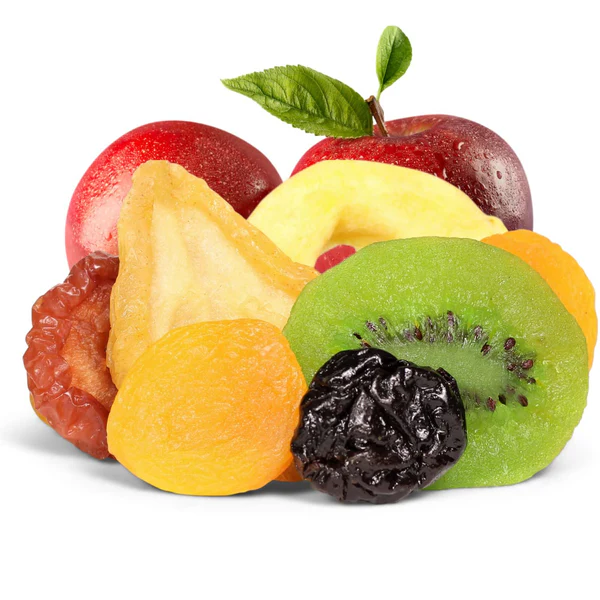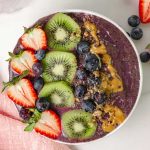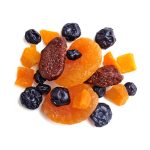Introduction to Dried Fruits
Dried fruit list! Dried fruits are nature’s sweet gift, packed with robust flavors and essential nutrients. They make an excellent snack option and add a delightful burst of taste to various dishes. These fruits undergo a drying process, removing most of their water content. This process enhances their sweetness and extends their shelf life, allowing us to enjoy their goodness throughout the year. Dried fruits are revered not just for their convenience and taste but also for their health benefits.

From kitchens to trail mixes, dried fruits have been a staple in diets worldwide. They come in various forms, such as raisins, dates, prunes, and more exotic types like figs and cranberries. Each type offers a unique set of nutrients and benefits. Popular for their portability, dried fruits are easy to store and carry, making them the perfect on-the-go snack for busy lives.
Beyond their role in snacking, dried fruits are incredibly versatile in culinary uses. They can be tossed into salads for a touch of sweetness, blended into smoothies for extra flavor, or baked into desserts for enhanced aroma and texture. This introduction serves as the gateway to understanding more about these nutrient-dense foods, setting the stage for further exploration into their health benefits and culinary potentials in the sections to come.
The Nutritional Benefits of Dried Fruits
Dried fruits are packed with essential nutrients. They are high in fiber, vitamins and minerals. Many are also full of antioxidants. These can help protect our bodies from free radicals that cause cell damage. The drying process concentrates the fruits’ natural sugars. This makes them a great source of quick, natural energy.
Dried fruits can provide a variety of health benefits including:
- Improved digestion: Fiber in dried fruit helps keep the digestive system running smoothly.
- Heart health: Many dried fruits contain potassium which may support heart health.
- Bone strength: Some dried fruits offer calcium and vitamin K, important for bone health.
- Skin radiance: The antioxidants and vitamins in dried fruits, like vitamin C and E, can promote healthy skin.
- Weight management: High-fiber foods help you feel full, aiding in weight control.
Eating dried fruit can also boost your intake of iron and potassium. This is essential for maintaining healthy blood and muscles. Besides their physical health benefits, dried fruits can also support mental well-being. With vitamins and minerals that are good for brain function, they can keep your mind sharp.
By adding dried fruits from the dried fruit list to your diet, you’re not just enjoying a tasty snack. You’re also investing in your long-term health.
Exploring the Variety: Common Dry Fruits and Their Uses
When it comes to variety, the dried fruit list spans an impressive range. Each type has uses that go beyond mere snacking. Here, we delve into some common dry fruits and ways to enjoy them.
Almonds find their place as both a heart-healthy option and a versatile kitchen staple. Snack on them whole, or slice them for a crunchy salad topping. Blended into almond butter, they make a nutritious spread.
Cashews are not just a tasty snack, but a rich source of protein and healthy fats. They work well in stir-fries, lending a creamy texture to sauces and desserts.
Cherished for their omega-3 content, walnuts support brain health. Crush them for a nutty crust on fish, or mix into oatmeal for a brain-boosting breakfast.
Raisins and dates provide quick, natural energy. They sweeten up baked goods and cereals without added sugar. Chop them up for a healthier sweet treat.
Pistachios and prunes assist in weight management and digestion. Add pistachios to pesto, or enjoy prunes on their own to aid regularity.
For those keen on trying new flavors, figs, fox nuts (makhana), and cranberries offer exciting benefits. Figs enhance fiber in diets, makhanas are great in a crunchy snack mix, and cranberries give a tart kick to breakfast bowls.
Whether incorporated into meals or enjoyed as is, these dried fruits are not just diverse in taste but also in health benefits and culinary uses.

Almonds: Heart Health and Versatile Snacking
Almonds reign as a top pick on the dried fruit list for good reasons. These kernels pack a punch for heart health. They are brimming with monounsaturated fats, which are kind to our hearts. Almonds also deliver a healthy dose of fiber and vitamin E, aiding in cholesterol management. Regular consumption can help maintain a robust cardiovascular system.
They do not just cater to heart health; almonds excel in versatility too. Their crisp texture makes them a popular snack choice. You can enjoy almonds raw, roast them for extra crunch, or soak them overnight for a softer bite. Their subtle flavor complements a vast array of dishes.
Mix almonds into yogurts, oatmeals, or salads. They lend a satisfying crunch and a nutrient boost. Crush them for a heart-healthy crust for baked goods. Or blend them into almond butter for a delicious spread.
Easy to carry, almonds fit well in snack mixes or as a stand-alone treat. They make for a filling snack, curbing hunger with their protein content. This can help with weight management.
Add almonds from the dried fruit list into your diet to enjoy their taste and health benefits. They cater to wellness with every bite, supporting heart health and snacking needs.
Cashews: Protein and Healthy Fats
Cashews are a staple on the dried fruit list, known for their versatility and health benefits. These kidney-shaped nuts pack a wealth of nutrients, including protein and heart-healthy fats. Often found in trail mixes, they make for an indulgent yet nutritious snack.
Cashews contain unsaturated fatty acids, which help in maintaining good cholesterol levels. Including them in your diet is beneficial for heart health. These nuts are also rich in protein, crucial for muscle maintenance and overall growth. This makes cashews an excellent choice for vegetarians seeking extra protein.
Moreover, cashews are a good source of minerals like magnesium and zinc. These contribute to immune system strength, bone health, and nerve function. Magnesium aids in managing blood pressure, while zinc is vital for the immune response.
Eating cashews can be as simple as grabbing a handful for a snack, or you could sprinkle them onto salads for extra richness. Crushed cashews add a creamy texture and nutty flavor to soups and stews. They can also be ground into cashew butter, offering a delicious and healthier alternative to traditional spreads.
When consuming cashews from the dried fruit list, remember that they are calorie-dense. Portion control is key to enjoy their taste and health benefits without overindulging. Nevertheless, when eaten in moderation, cashews can be a fantastic addition to a balanced diet, promoting overall well-being with their impressive nutritional profile.
Walnuts: Omega-3s and Brain Health
Walnuts are a brain-boosting powerhouse on the dried fruit list. These nuts are rich in omega-3 fatty acids, which are essential for brain health. Omega-3s help to create neural connections, improving memory and cognitive function. Eating walnuts can support brain health over time.
They’re not just good for your brain, though. Walnuts also contribute to a healthy heart by managing cholesterol levels due to their omega-3 content. Plus, they offer antioxidants, which fight off harmful free radicals. These benefits make walnuts a strong ally in your diet.
Snack on walnuts as they come, or chop and sprinkle on salads for added crunch. They also taste great mixed into yogurts or oatmeal. With walnuts from the dried fruit list, you’re getting more than just good taste; you’re nurturing your mind and body.
Raisins and Dates: Energy-boosting Sweetness
Raisins and dates are staples on the dried fruit list for their natural sugars. These fruits provide quick, wholesome energy. They can combat fatigue and boost stamina.
Raisins are dried grapes known for their sweet taste and health benefits. They provide iron which is key for blood health. Their fiber aids digestion.
Enjoy raisins on their own or mix into oatmeal and salads. They bring a touch of sweetness to every dish. Raisins can also enhance baked goods like muffins and cookies.
Dates are another excellent energy source. These fruits are rich in potassium which supports muscle and nerve function. Dates also offer dietary fiber, promoting gut health.
You can snack on dates any time for a quick energy lift. They also work well in smoothies and desserts. Chopped dates add natural sweetness to dishes, reducing the need for added sugar.
Both raisins and dates are fantastic for anyone needing a sweet, energy-filled snack. Incorporate them from the dried fruit list into your diet. Feel their natural, sustaining power.

Pistachios and Prunes: Weight Management and Digestion
Pistachios are not just tasty; they’re valuable for weight management. These green nuts are protein-packed, which can help you feel full longer. This cuts down on overeating. What’s more, they have fiber. Fiber aids digestion and keeps hunger at bay, aligning with weight goals. Munching on pistachios is easy. Use them as a snack, or toss into salads.
Besides pistachios, prunes also support digestion. Prunes, or dried plums, are high in fiber. They help maintain regular bowel movements. Prunes also provide vitamin K. This vitamin is important for bone health. Enjoy prunes as they are, or add them to morning oatmeal.
Both pistachios and prunes have antioxidants. These substances can reduce cell damage. They also contain nutrients that promote overall health. When you add them to the dried fruit list in your diet, you give your body a boost. You can manage weight and support digestive health with these choices. Remember, moderation is the key. It ensures you reap the benefits without excess calories. Include pistachios and prunes from the dried fruit list to enjoy their delicious benefits.
Exotic Picks: Figs, Fox Nuts, and Cranberries
Figs: Fiber and Mineral Rich
Figs stand out on the dried fruit list for their unique nutritional profile. They are loaded with dietary fiber, which aids in digestion. Figs also provide essential minerals like calcium and potassium, boosting bone health and blood pressure regulation. Enjoy figs in your diet by adding them to yogurt or salads for a nutrient-boost.
Fox Nuts (Makhana): Low-Calorie Snacking
Fox nuts, or makhanas, are revered in many cultures for their health benefits. They are low in calories, making them a perfect snack for weight management. Rich in protein, they stave off hunger effectively. You can roast makhanas with a pinch of salt for a crispy, healthy snack. They’re also great in snack mixes.
Cranberries: Vitamin C and Antioxidant Powerhouse
Cranberries are a vibrant addition to the dried fruit list. They are a rich source of vitamin C, which boosts the immune system. The antioxidants in cranberries help fight inflammation and support urinary tract health. Add dried cranberries to your morning oatmeal or a trail mix to enjoy their tart flavor and health benefits.
How to Incorporate Dried Fruits into Your Diet
Incorporating dried fruits into your diet can be both easy and delicious. Here are some straightforward ways to enjoy these nutritious snacks:
- Mix and Match in Meals: Enhance your breakfast by adding a handful of raisins, cranberries, or chopped dates to your oatmeal or cereal. They add natural sweetness and a nutrient boost.
- Create Tasty Trail Mixes: Combine nuts like almonds, walnuts, and cashews with dried fruits for a portable and energizing snack mix.
- Sprinkle Over Salads: Give your greens a sweet and crunchy twist by sprinkling figs or dried cranberries on top.
- Bake with Benefits: Swap out sugary ingredients in your recipes with diced prunes or raisins to add natural sweetness to baked goods.
- Homemade Energy Bars: Blend dates with nuts and seeds to make your own nutritious energy bars.
- Yogurt Toppings: Top your yogurt with makhana or slivered almonds for added texture and a healthful touch.
Remember to opt for unsweetened or lightly sweetened dried fruits to keep sugar intake in check. Also, keeping an eye on portion sizes ensures you enjoy the health benefits of dried fruits without consuming too many calories. With a bit of creativity, you can easily add dried fruits from the dried fruit list to every meal, reaping the blend of flavors and health benefits they offer.
Conclusion: Embracing Dried Fruits for Overall Well-being
The journey through the dried fruit list reveals their unmatched value. It highlights their abundant nutrients and wide-ranging health benefits. Rich in fiber, vitamins, and minerals, dried fruits are more than just snacks. They’re powerful allies in our quest for better health.
Almonds, cashews, and walnuts from the list bring heart and brain benefits. They offer us essential fats and proteins. Fruits like raisins and dates give fast, natural energy boosts. All are easy to include in our daily meals.
Pistachios and prunes support weight management and digestion. Exotic picks like figs, fox nuts, and cranberries add unique flavors and health perks. Each one has a special place in our diets.
Eating dried fruits is simple. Mix them into cereals, bake them into treats or nibble them as snacks. They fit into any part of the day. Remember to eat them in moderation. This way, we take in their goodness without too many calories.
In all, the dried fruit list supports our well-being. It offers a delicious, natural path to maintaining better health. Let’s include these tasty treasures in our diets. We’ll enjoy their richness in flavor and their boosts to our health.


